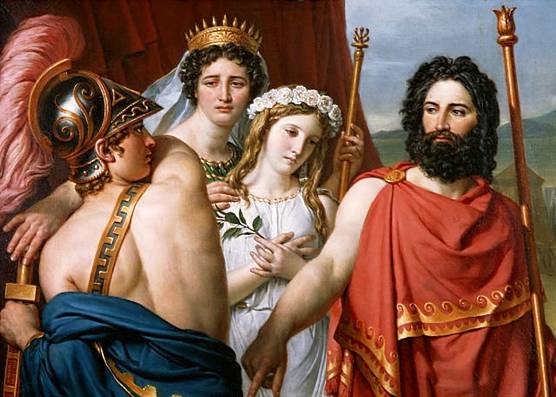- Iphigeneia at Aulis
Infobox_Play | name = Iphigenia at Aulis

caption = Anger of Achilles by Jacques-Louis David
writer =Euripides
chorus = Greek Women
characters =Agamemnon Menelaus Clytemnestra Iphigenia Achilles
attendant
setting = Port ofAulis "Iphigenia at Aulis" (Lang-el|Ιφιγένεια εν Αυλίδι / "Iphigeneia en Aulidi") is the last extant work of the playwright
Euripides . Written between 408, after theOrestes , and406 BC , the date of Euripides' death, the play was first produced the following year [See Hans Christian Günther, "Euripides. Iphigenia Aulidensis", Leipzig, Teubner,1988 , p. 1.] by his son or nephew, Euripides the Younger, [See Suda, s.v. polytonic|Εὐριπίδες.] and won the first place at the athenian CityDionysia .The play revolves around
Agamemnon , the leader of the Greek coalition before and during theTrojan War , and his decision to sacrifice his daughterIphigenia to allow his troops to set sail and preserve their honour by doing battle againstTroy . The conflict between Agamemnon andAchilles over the fate of the young woman presages a similar conflict between the two at the beginning of the "Iliad ".Background
The Greek force is waiting at
Aulis , with its ships ready to sail for Troy, but it is unable to depart due to a strange lack of wind. After consulting the seerCalchas , the Greek leaders learn that this is no mere meteorological abnormality but rather the will of the goddessArtemis , who has checked the winds because Agamemnon has caused her offense.Calchas informs the general that, in order to placate her, he must sacrifice his eldest daughter, Iphigenia. Agamemnon, in spite of his horror, must consider this seriously, because his assembled troops, who have been waiting at port and are increasingly restless, may rebel if their bloodlust is not satisfied. He sends a message to his wife,
Clytemnestra , telling her to bring Iphigenia to Aulis, on the pretext that the girl is to be married to the Greek warrior Achilles before he sets off to fight.Plot
At the start of the play, Agamemnon has second thoughts about going through with the sacrifice and sends a second message to his wife, telling her to ignore the first. Clytemnestra never receives it, however, because it is intercepted by
Menelaus , Agamemnon's brother, who is enraged that he should have changed his mind.To Menelaus, this is not only a personal blow (for it is his wife,
Helen , with whom the Trojan prince Paris ran off, whose retrieval is the main pretext for the war); it may also lead to mutiny and the downfall of the Greek leaders should the rank and file discover the prophecy and realise that their general has put his family above their pride as soldiers.The brothers debate the matter and, eventually, each seemingly changes the other's mind: Agamemnon is now ready to carry out the sacrifice, but Menelaus is apparently convinced that it would be better to disband the Greek army than to have his niece killed. By this time, Clytemnestra is already on her way to Aulis with Iphigenia and her baby brother Orestes, making the decision of how to proceed all the more difficult.
Iphigenia is thrilled at the prospect of marrying one of the great heroes of the Greek army, but she, her mother and the ostensible groom-to-be soon discover the truth. Achilles is furious at having been used as a prop in Agamemnon's plan and vows to defend Iphigenia—initially more for the purposes of his own honour than to save the innocent girl.
Clytemnestra and Iphigenia try in vain to persuade Agamemnon to change his mind, but the general believes that he has no choice. As Achilles prepares to defend the young woman by force, she has a sudden change of heart, deciding that the heroic thing to do would be to let herself be sacrificed. She is led off to die, with her mother Clytemnestra so distraught as to presage Agamemnon's mariticide.
In addition to all this, a messenger arrives at the end of the play to inform Clytemnestra that, at the last minute, just as Agamemnon was about to kill his daughter, Artemis, apparently appeased, switched the body of Iphigenia with that of a deer, which was sacrificed in her stead. Iphigenia is swept away to Artemis's temple at
Tauris ; the subsequent events are portrayed in Euripides's earlier play "Iphigeneia in Tauris ".Cultural influence
"Iphigenia at Aulis" has had a significant influence on modern art. Greek director
Michael Cacoyannis based his1977 film "Iphigenia" (starringIrene Papas as Clytemnestra) on Euripides's script. The play also formed the basis for the2003 novel "The Songs of Kings " byBarry Unsworth , as well as theP.D.Q. Bach cantata "Iphigenia in Brooklyn."Neil LaBute drew heavily on the story of Iphigenia for his short play "Iphigenia in Orem ", one of his Bash series.Translations
*
Jane Lumley (1537–1578), ca. 1555
* Robert Potter, 1781 - verse
*Edward P. Coleridge , 1891 - prose: [http://etext.library.adelaide.edu.au/e/euripides/ip_aulis/ full text]
*Arthur S. Way , 1912 - verse
* Florence M. Stawell, 1929 - verse
* Charles R. Walker, 1958 - verse
*Paul Roche , 1998 - verse (Euripides: Ten Plays (Signet))
*James Morwood , 2002 - verse
*T.A.Buckley 1892 [http://www.ihaystack.com/authors/e/euripides/index.htm] full text
*G.Theodoridis 2007 [http://bacchicstage.com/] full textReferences
External links
* [http://classics.mit.edu/Euripides/iphi_aul.html Text at The Internet Classics Archive]
* [http://www.perseus.tufts.edu/cgi-bin/ptext?doc=Perseus%3Aabo%3Atlg%2C0006%2C018&query=49 Text at The Perseus Digital Library, Tufts University]
Wikimedia Foundation. 2010.
